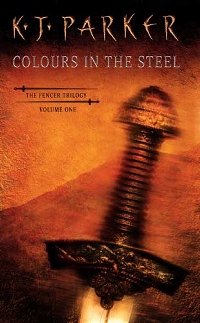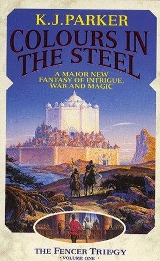 Instead of sticking to a series and read every volume before I move onto something else I try to cover as many authors I can, so that I can have a better idea of the fantasy genre as it is today. The mysterious K.J. Parker isn’t one who gets as much attention as other, more popular writers, but in comments and reviews I read she (we assume it’s a she, but the true identity is unknown and name used just an invention, being mysterious like that) has a very good reputation and more than once caught my attention. Especially when Pat posted an excerpt from a recent book that I thought was brilliant. I made a mental note to buy that book when it came out (a standalone), but sooner than that I read some more comment of an earlier trilogy she wrote (The Fencer Trilogy) whose first book was a detailed and realistic description of a siege to a city, down to the smallest details.
Instead of sticking to a series and read every volume before I move onto something else I try to cover as many authors I can, so that I can have a better idea of the fantasy genre as it is today. The mysterious K.J. Parker isn’t one who gets as much attention as other, more popular writers, but in comments and reviews I read she (we assume it’s a she, but the true identity is unknown and name used just an invention, being mysterious like that) has a very good reputation and more than once caught my attention. Especially when Pat posted an excerpt from a recent book that I thought was brilliant. I made a mental note to buy that book when it came out (a standalone), but sooner than that I read some more comment of an earlier trilogy she wrote (The Fencer Trilogy) whose first book was a detailed and realistic description of a siege to a city, down to the smallest details.
The siege and a lot more I found in the 500 pages of the book. I’m not one to have prejudices, but thinking that the writer may be a woman couldn’t be more misleading. There’s a constant in her writing that I read is common to all her books, and it is the cynicism. This is a story that is always told from a detached point of view. Surgical. It’s like a screen that filters and separates the one who tells the story and what goes on in it. You are, in reading and sharing the seat occupied by the writer, an observer. This is a displacement that is always present. But the cold, detached point of view is perfectly balanced and matched with a sense of humor that makes the writing always interesting.
It’s easy to be mislead by the premises. Along with the cynicism there’s also an obsession with the technical details. At times the book stops to be a story and becomes a technical manual about how to build siege engines and other tools of war. It explains the materials, how they are chosen, how they are treated, all the steps that are required up to the final output. Then explains you how to use them. Whether it is about fencing or how to properly plan the siege to a mythical high-walled city that is the theme of this book. One would assume that a read couldn’t be more boring and I imagine you thinking right now of reading this book and falling asleep after two paragraphs. Instead it’s surprisingly compelling and it’s all merit of the writing itself.
As odd it may sound, this is a character-driven book. None of the characters stand out as memorable. There isn’t any way to quickly describe them and the reason is that they aren’t stereotypes. This is far from a typical fantasy novel and more alike to an historical fiction that isn’t historical simply because the setting isn’t real. But it is real in every element that forms it. An imagined story whose aspects are meticulously researched. The same treatment that goes in the setting goes in the characters. We don’t have key-roles or striking, recognizable characters. We have normal people, defined even here with attention to the detail. They are part of their world down to their mentality. If I had to make an example I’d use Richard Morgan. If in Richard Morgan you have a fantasy written through a modern eye (like we see in the dialogues), here we observe characters that truly live in the book and are shaped by what’s around them. With plenty of natural blind spots.
The execution is excellent. You can’t avoid to admire what the writer did here. The way she can transform potentially boring parts in pages that you can’t stop reading. What is up-to-date is the point of view, the writing itself and cleverness, even wisdom, disillusion. Cynicism again. Black humor. Sometime you feel like you are observing one wicked experiment where guinea pigs struggle and die in the most cynical ways. That detachment between what we know as people of our time, opposed to a medieval world with all its simplicities. You can see what is coming and it produces a wicked sense of humor since you aren’t there, you are observing how people are stupid, or just victims of their time. Victims of simple beliefs. Or just victims in general because no one can really control anything.
There are no winners. There’s also a kind of predestination that is bound with the idea of progress. The medieval world is allegory of “change”. Of science versus beliefs. One day before the age of enlightenment. Parker here is the innate, perfect writer for the task. In the same way there’s this dualism of modernism and pre-modernism, the writer incarnates the perfect match and dualism of the soulless meticulous technical detail and the sense of humor and originality that ties everything together. Art and tech. Enhanced with an air of magic that exist in the book, but that is another allegory of itself. Not a showy, controllable magic. Not fireballs, invisibility, flight or other useful uses. Not devices and desires. But an hopeless fight against destiny and its whims. Trapped guinea pigs that can only believe the illusion in front of the eyes and that are fated to be victims. Humorous tragedies of life that you enjoy only till you understand that the huge distance between you and them is an illusion too.
Don’t expect from this book a story with heroes, spectacular battles or even complex political intrigue or power struggle. Don’t expect escapism or identification. This book needs brain and is great when you admire its cleverness in all its aspects. It has none of the trappings that appeal to younger readers, none of the immediate appeal and satisfaction. It is infinitely more subtle but also more satisfying. In any case this is an original voice that is precious in the genre. The flaw is that she wrote many books and, while investigating many different aspects and improving in what she does best, they all play with similar tones. But if you want to explore human genius and despair at once, this is the best journey.
P.S.
First volume in a trilogy, but the ending is so satisfying that you can take this as a standalone. The choice to move on the next books is on the reader more than forced by the plot.

